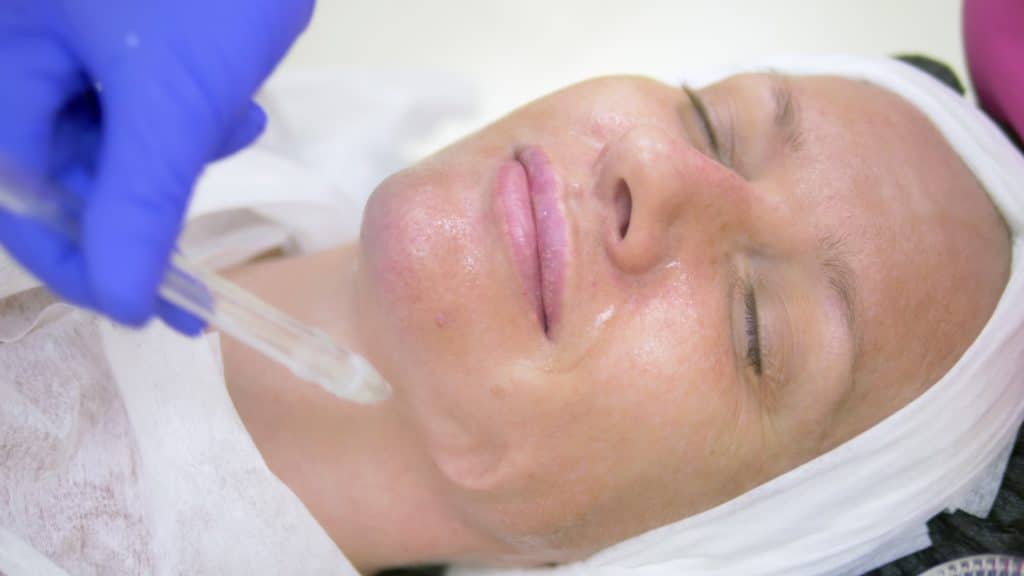When people hear about chemical peels, they often get concerned and wonder whether or not chemical peels are good for your face or if they’ll damage your skin. After all, they’re chemicals that are being applied to your face that then peel it… It sounds suspicious, and like a recipe for disaster. You’ll be relieved to learn that chemical peels can indeed be quite beneficial and improve your skin in many different ways. As with everything, though, they do have their risks, especially for those with darker skin tones.
Here’s what you need to know about chemical peels, how they can be good for your face, the different types of peels, and their benefits and risks. Let’s jump into it!
What Are Chemical Peels?

Chemical peels are dermatological procedures during which chemical solutions are applied to your skin in order to remove the topmost layers. The purpose of them is to help your skin grow back smoother and treat a variety of skin concerns, such as scars, discoloration, wrinkles, and more. There are several different levels of peels that you can get, and they can often be combined with other cosmetic procedures.
Types Of Chemical Peels
There are three different levels of chemical peels. The type of peel that you receive will depend on your skin type, skin tone, and your specific skin concerns that you’re wanting to address. Superficial peels don’t exfoliate your skin as deeply as medium or deep peels do.
The three basic types of chemical peels are:
- Superficial. These peels are used for skin issues that only impact the top layer of your skin. They heal faster than the other two types, as they are the gentlest. You can expect to heal from a superficial peel within a week, and expect a lower risk of side effects. Because these are the gentlest type, you may need multiple sessions in order to obtain your desired results. You may have a superficial peel done every 2-5 weeks.
- Medium. Medium peels are used for more in-depth skin issues, such as sun-damage, minor acne scarring, and fine wrinkles. These take anywhere from a week to 2 weeks to heal. You can typically expect some initial swelling that will dissipate as you heal. Your dermatologist may prescribe a solution and medication for you to take while you heal. You may need to have multiple peels in order to achieve your desired results.
- Deep. These chemical peels are usually done at outpatient surgical centers, and usually, your dermatologist will recommend you try laser therapy. However, if you have issues such as severe sun damage or severe hyperpigmentation, a deep peel can treat them. They take anywhere from 2-3 weeks to heal and necessitate more intensive aftercare than the other two types of chemical peels. You typically only have a deep peel done once a decade.
Are Chemical Peels Good For Your Face?
The truth is, it depends! Chemical peels aren’t suitable for everyone. However, they can be extremely effective and help you achieve the smooth, clear skin of your dreams. Here’s what you need to know about the benefits and risks of these peels.

Benefits Of Chemical Peels
Chemical peels are typically used to reduce signs of aging on your face. They can help with many different skin concerns. The results vary depending on your skin and the type of peel that you receive.
Chemical peels can help:
- Wrinkles and fine lines
- Acne scars
- Scars
- Sun damage
- Hyperpigmentation
- Uneven skin tone
- Skin texture
- Redness
- Melasma
- Acne
- Dullness
- Precancerous growths
These peels are most beneficial to those who have generally healthy skin, a lighter skin tone, and mild scarring/wrinkles.
Risks Of Chemical Peels
Typically, side effects of these peels are mild, but they do have risks associated with them and are not good for everyone.
Some risks of chemical peels include:
- Redness
- Scarring
- Lightened skin patches
- Darkened skin patches
- Infection
- Heart, kidney, or liver damage (for deep peels)
Your doctor will likely advise you against getting a peel or a specific type of peel if you:
- Have heart disease
- Have a dark skin tone (although superficial peels can be done by experienced dermatologists with lessened risk of hyperpigmentation)
- Are pregnant or breastfeeding
- Have recently undergone surgery or radiation therapy
- Have sagging skin
- Have deep scars or wrinkles
- Have recently taken oral acne treatments, like Accutane
- Have psoriasis
It’s best to consult with your dermatologist in order to determine whether or not these peels are right for you.

Are You Ready To Try A Chemical Peel?
Intermountain Aesthetics Med Spa provides chemical peel treatments that can help you achieve a smoother, tighter face. Contact us today to receive a free consultation to determine whether or not you are a good candidate for a chemical peel.



